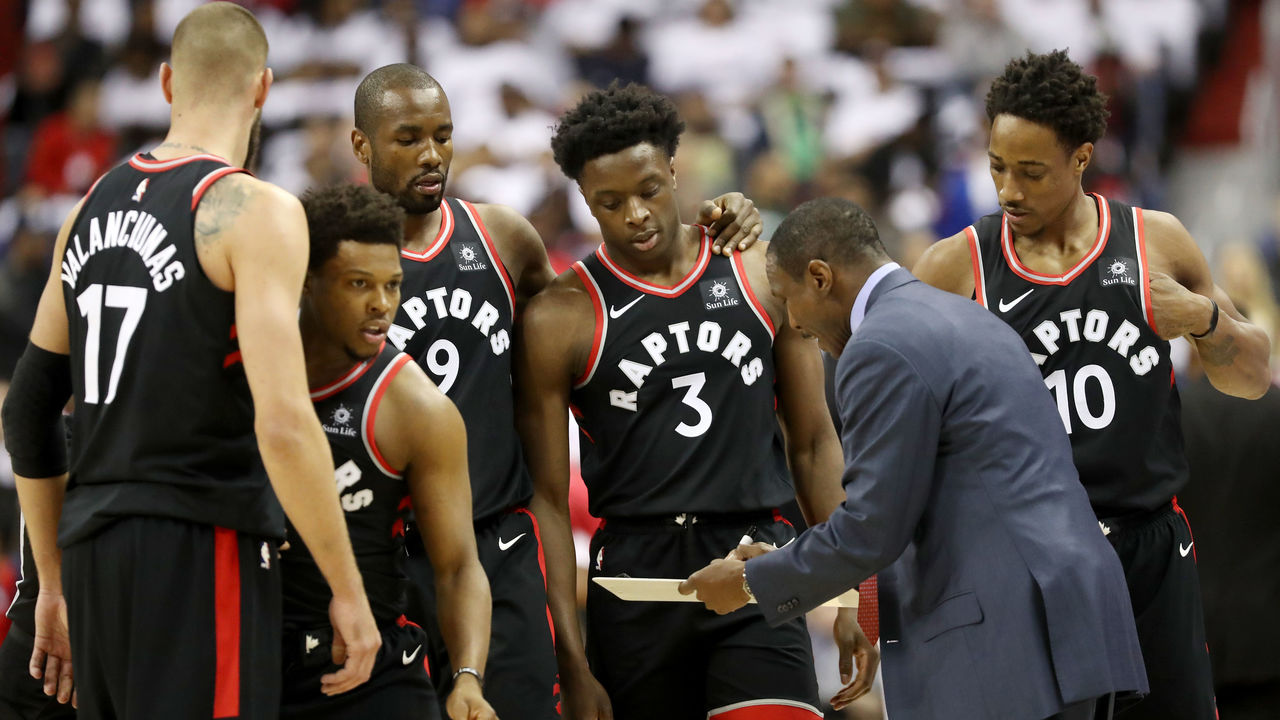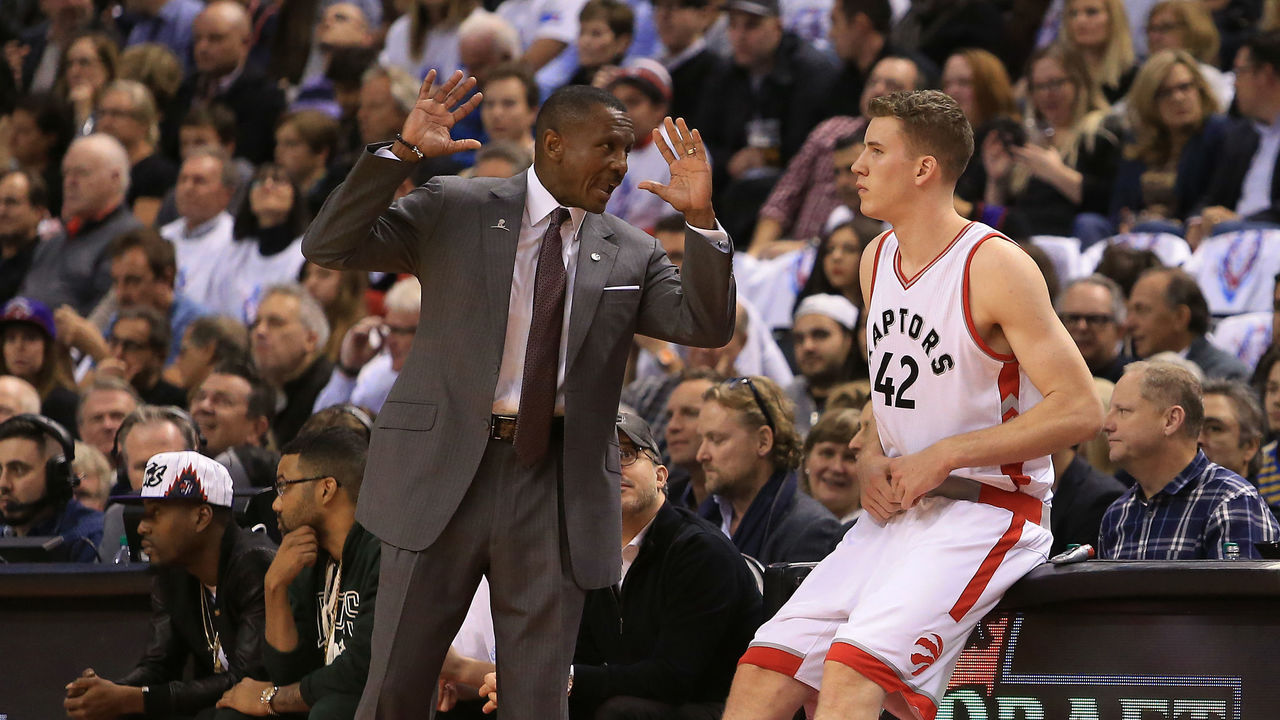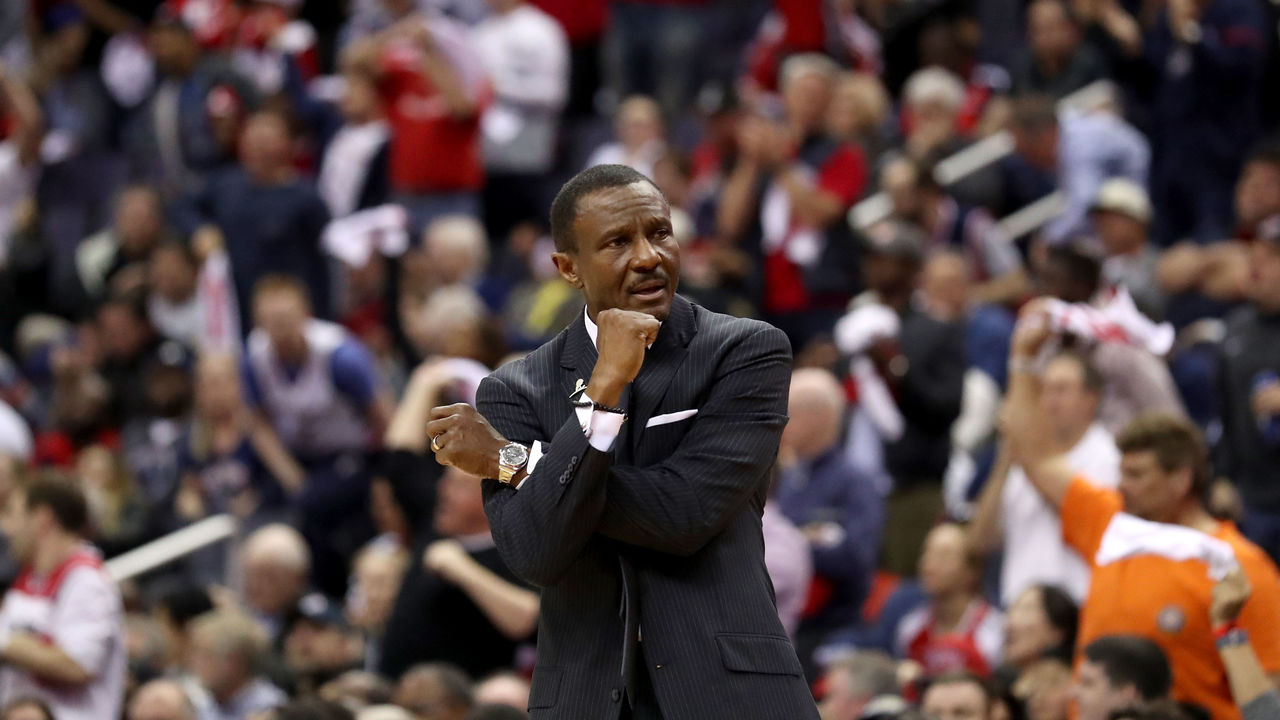Dwane Casey took the Raptors as far as he could take them
Dwane Casey's seven-year tenure as Toronto Raptors head coach came to an end on Friday, and while the move was somewhat predictable after the Raptors suffered a second straight sweep and third straight playoff defeat at the hands of the Cleveland Cavaliers, it still marks an abrupt right turn for a franchise that has thrived through continuity and is still ostensibly in the midst of the most successful era of basketball it's ever experienced.
In 2011, Casey inherited a broken, train wreck of a team with little hope of reversing its moribund fortunes. Jilted by Chris Bosh, the Raptors were coming off a 22-win season in which they finished last in the NBA in defensive rating. In Casey's first season at the helm, they jumped to 14th on defense. Two years later, they were a 48-win division winner that ranked in the top 10 on both ends of the floor. Two years after that, they crossed the 50-win threshold for the first time ever and made their maiden trip to the Eastern Conference finals. Another two years and they won a franchise-record 59 games, finished top five on both sides of the ball, and claimed their first-ever No. 1 seed.
The progress wasn't perfectly linear, and there were plenty of other factors that contributed to the team's rise - specifically the shrewd roster building by president Masai Ujiri - but Casey was instrumental in transforming the Raptors from a doormat into a consistent winner. During his tenure, he was as successful as anyone in the league at managing the big-picture elements of coaching - player development, relationship building, professionalism, communication - and he made strides every year with the more granular, tactical stuff for which he was so often criticized. His growth as a coach mirrored that of the Raptors as a whole. His identity and that of the team were deeply intertwined, and in many ways, he shaped it in his own image.

He is, by all accounts, an exceptional human being. Kyle Lowry and DeMar DeRozan speak about him as a father figure. He's won plaudits for his honest and affable relationship with the media and the public. And in his press conference Friday after firing Casey, an emotional Ujiri called the decision the "hardest thing I've ever done," and said, "I don't think I'll work with a better person."
And until this season got blown to bits against the Cavs, it was undeniably Casey's crowning achievement. It was the season the previous six had been steadily building to, the point at which his macro- and micro-managerial skills merged. He transformed his offense from one of the league's most antiquated systems to one of its most modern. He'd spent six years building up the requisite trust to make something like the "culture reset" possible, getting Lowry to buy into an off-ball role and DeRozan to sacrifice scoring for facilitating, and convincing both to take on dramatically reduced minutes loads.
At a time when coaches get pilloried for not staggering their star players' minutes, Casey unlocked a magical all-bench lineup that was the third-most efficient five-man group in the NBA. To make that possible, he leaned heavily on a group of unproven young players, while challenging and empowering them to expand their games. The engine of that lineup, meanwhile, proved to be an undrafted second-year player who'd been the team's fourth-string point guard a year prior, and who got off to a miserable start to the season. Where would the Raptors be if Casey had given up on Fred VanVleet?

As with his entire body of work with the Raptors, though, the season wound up being fraught with contradictions. All the changes Casey and the Raptors made, all the unprecedented success they experienced, didn't change their playoff fortunes one bit. They lost to the Cavs in the same round, in the same number of games. For once, their offense didn't implode in the postseason - confirming that Casey and his staff had the right of it in overhauling the system - but so many of the same problems still cropped up. The Raptors were slow to make adjustments and failed to anticipate the adjustments their opponents made. They often looked unprepared, for both their matchup and for the moment, and in the face of adverse situations - be it an unfavorable call or a blown opportunity in Game 1 - they lost conviction and played like a defeated team.
That doesn't all fall on Casey, obviously, but it's far from the first time the Raptors have suffered because of his preference for reactivity over proactivity. Even the justifiably celebrated culture reset was arguably a microcosm of that issue; maybe it should have happened sooner. Casey became exponentially more flexible over his seven years in Toronto and improved markedly at adjusting between games. But against playoff opponents that had time to prepare for the Raptors and exploit their weaknesses, in-game adjustments continued to be a struggle for him. Year after year, the playoffs have exposed his flaws as a coach the same way they've exposed the cracks in the Raptors' player personnel. Ujiri was reportedly frustrated by numerous decisions Casey made in the Cavs series, from an inability to inbound the ball out of timeout in Game 1, to a decision to stick with Jonas Valanciunas and Serge Ibaka in the frontcourt when the Cavs went small, to a failure to have his players trap LeBron in the backcourt before he went the length of the floor and hit the buzzer-beating winner in Game 3.
The disconnect between the regular-season Raptors and the playoff Raptors has made it impossible to judge whether the Casey-era Raptors are over- or underachievers, whether they're greater or less than the sum of their parts. In the regular season, the Raptors consistently outperformed their talent level under Casey's watch thanks to a combination of self-knowledge, preparedness, focus, and night-to-night effort. Each year, projection models pegged them for mid-40s wins, and each year they blew past those projections.

At the start of this season, they were expected to be a middle-of-the-pack playoff team in the same stratum as the Wizards and Bucks. Over the course of the season, as their new formula bore fruit and the Cavs dealt with disharmony and decline, the goalposts moved, and the expectation for the Raptors became ending LeBron's run of seven straight trips to the Finals. That expectation was probably misplaced, and ultimately, Casey became a victim of his own success. By coaching the team up in the regular season, he created playoff expectations the roster was probably not equipped to satisfy.
It became clear in the most recent Cavs series, though, that Casey had taken the Raptors as far as he could - which was higher than anyone could've reasonably expected when he took the job, but not high enough to justify keeping him on only to run into the same wall every spring. Even if his replacement winds up sending the same basic message to the players that Casey did, it's important they hear it from someone else. Sometimes these things just run their course.
"In some ways, I think the time has come," Ujiri said. "These things come to an end. Relationships come to an end."
NBA teams are like sharks; they die if they aren't constantly moving in one direction or another. The Raptors have done an admirable job of shape-shifting while keeping their Casey-Lowry-DeRozan-Valanciunas nucleus together for the last six years. But, having already changed the roster at the margins, cycled through role players, and overhauled their playing style, the Raptors had kind of played all their cards under Casey and plateaued.
Barring a significant offseason roster shakeup or another major, collective leap from their youngs (which is improbable, but not out of the question), the Raptors are likely going to keep running into the same stumbling blocks, regardless of the coach they bring in. But this move at least keeps the shark moving; this, at least, allows them to fail differently.